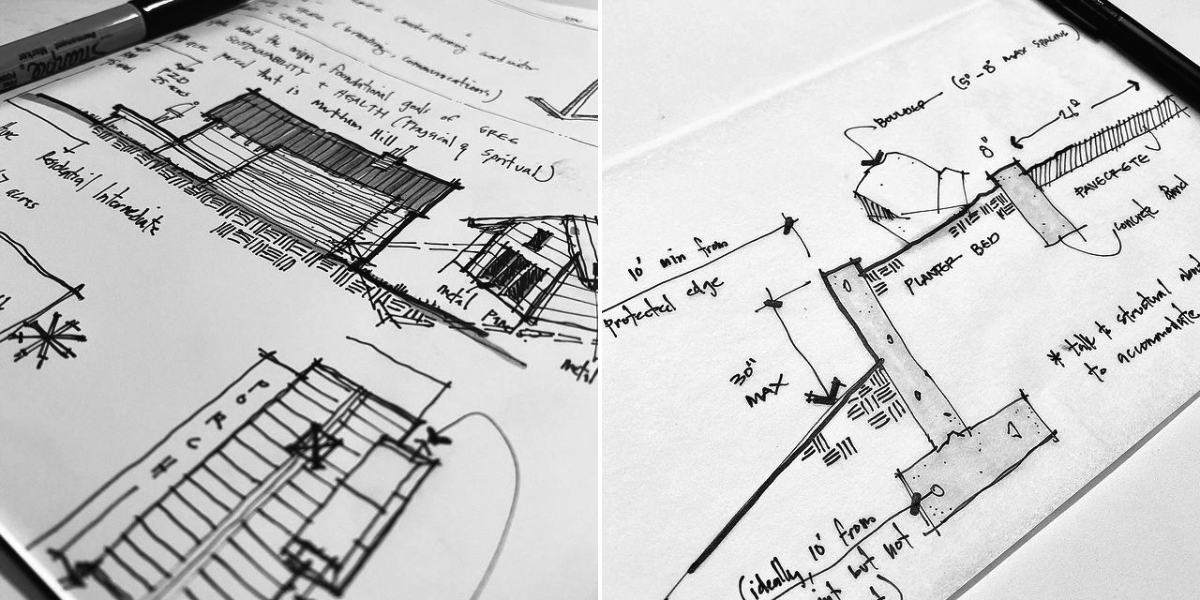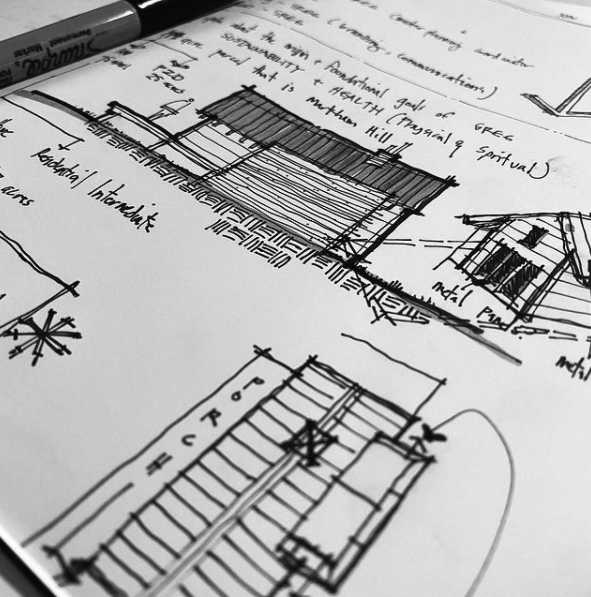How old were you before you learned that architects exist? Do you remember that class you took in elementary school that talked about architects and architecture? Of course, you don’t, because for 99% of us, that class didn’t exist. Today we are going to be talking about the fantasy of being an architect versus reality. Welcome to Episode 72, “Architectural Disconnect.”
What Kids Think about Architects and Architecture jump to 01:37
How old were you before you knew architects existed? This seemed like an obvious starting point to begin our conversation and the difference between my answer and Andrew’s answer literally had me shook. I wrote a post years ago titled “Why I am an Architect and Not an Astronaut” and it covers the story of how I decided I was going to be an architect when I was 5 years old and my Dad gave me a drafting board for Christmas. In contrast, Andrew was 19 years old when he knew that being an architect was an actual job and it wasn’t until he took an architectural history course his first year in college.
When I was still in my formative years, even though I had decided to be an architect, it wasn’t until I was in college, might have even been my first day in class, when I was asked to list my 5 favorite architects …. and I could only come up with 2.
ONLY TWO!!!! What am I doing in architecture school?!? I’m not going to tell you here which two I knew, you have to listen to the podcast to get that secret.
I might be willing to give myself a bit of a break on this because the internet didn’t exist, there weren’t any dedicated channels on TV that discussed design or architecture (the closest thing was “This Old House” on PBS which I watched religiously) and so I wasn’t exposed to any architects just as a normal part of going through my day – which I think is at the root of our issues. Granted, things are a lot different today and I probably receive a handful of emails weekly from kids ranging between 12 and 18 years of age who are doing a school project and need to speak with an architect. The exposure is definitely better but few people really understand the role that architects play every day in their lives … we are invisible to most people.
Exposure to Architecture in Lower Education jump to 08:58
 AIA Study from 2015 – Identification of educational programming that offered opportunities for students to engage and learn about the field of architecture (click image to access findings).
AIA Study from 2015 – Identification of educational programming that offered opportunities for students to engage and learn about the field of architecture (click image to access findings).
I spent time researching the lower school curriculum of dozens of schools and pretty much none of them have any sort of formal core-required coursework associated with architecture. To my great surprise, almost all of the information that is readily available comes from homeschooling programs. I had mixed reactions to learning this; sadness that public education is so lacking in this country, and WOW that homeschoolers seemed to have figured out that architecture is a great platform to teach a wide array of critical thinking and visualization skills.
There are more middle school and high school level classes that are coming online, but none of which I’ve seen are part of a required school-wide curriculum. I routinely take part in presenting and acting as a judge/juror to high school programs in my area, and these are part of an independent school district (which means they are not private school programs) and the engagement and interest is there, but the reach and availability is not in place.
One of the items we discussed on the episode that I was happy to find, was 6-years of curriculum, put together by the Michigan Architectural Foundation, that starts in year one with kindergarten students and continues through 5th grade. You can download all these lesson plans for free!! (here). We also talk about a few high school programs just around in the surrounding communities of Dallas that offer specialized classes that would help prepare students for a career as an architect. There is the TECC|East Architecture Studios which are a part of the Lewisville ISD’s career and technical education program. It’s run by Chris Carson who is a licensed architect who graduated with his undergrad from Texas A&M and received his Master’s from the Univ. of Texas at Arlington. (FYI – TECC stands for Technology, Exploration & Career Center)
Andrew brought up the City Lab in Dallas which does have a Career Development Center in the Magnet program that is specific to Architecture but when you go down the rabbit hole and look for more information, the links to things like “General Information”, or Course Descriptions” you receive an error page … which of course you do.
We also discuss a list that is currently being assembled that shows all the architecture programs that exist all around the state of Texas – which I’ve seen and Andrew is much more heavily involved with creating, but that list is not ready to be shared yet. Once it is released, I will come back here and update this post and provide a link to the research.
Perceived Skills Needed to be an Architect jump to 18:01

I did a search to find out if there was a specific list of qualities that would point you towards a career in architecture and during my research, I found a quiz you could take. In my ongoing pursuit of knowledge, I took this quiz right before Andrew and I recorded today’s episode. I don’t have a very high opinion of this particular quiz (which is why I am not going to provide a link but if you have one you like, let me know in the comment section down below). Part of the reason I didn’t like this quiz was the extremely obvious or non-architecture specific sort so questions they asked like “Do you like to write?” “Do you like to stand in front of a large group of people and talk?” and “Can you visualize things in 3-dimensions in your mind?”
Pretty generic stuff if you ask me.
Most people think you need to be great at math – which is not particularly true. I have covered this topic many times (Architects and Math) and the short version is “No”, you do not have to be a math wizard to find success as an architect. You do need to understand the basics that you probably learned in grade school but that’s really about it.
What about drawing – things like sketching or drafting? Definitely not, but I do think that it is a skill that you can and SHOULD learn but if you are in High School or below, this should not be a consideration for whether or not you can be an architect. I have covered this topic probably more than any other (Architects and Sketching)
Something that we mention at the 23:48 mark and here is a link to the post I mentioned listing the different types of roles and responsibilities an architect can have within the same firm: 043: Inside the Firm. This list is profound and the skill set these individual jobs require is that for most people, if you want to be an architect, there is a role for you.
School Environment versus Professional Work Environment jump to 32:14

One of the biggest shocks to new graduates is just how different the studio environment is when compared to a professional office environment. I’m not going to say that studio was fun (which it was) and the office is a drag (which it isn’t) but they are completely different. When I was in school, compared to most, I got up to the studio early. It didn’t take me too long to realize that if I started early and got more of my work done before other people even got out of bed, I had more options available to me to live my life. Most of my friends were not in the architecture school and if I wanted to hang out with them, I needed to get as much of my heavy lifting done in the morning. The reality is that I still spent a ton, some would say an exorbitant amount of time in the studio … but I loved being there. Most of the time, my manner of working allowed me to engage with others and participate in desk crits far more often. I also rarely did all-nighters because nobody does their best work between the hours of 2 am and 6 am.
Some of the differences we discuss include:
1. Speed at which problems are to be solved
2. Things like budget and deadlines as drivers of design – Here is a link to the project I referenced when talking about the most expensive per-square-foot project I’ve ever worked on: Modern Cabana
3. Team environment – rarely did I have to collaborate on a project when I was in school. Now, I never work on an island and everything is team-oriented.
4. Most people aren’t actively designing in a professional office. The items you focus on in school are extremely design-centric.
5. Spend more time in the studio but get more work down in the office
Maybe I’m different but I liked being in the studio when I was in school, and I really like being in the office now. The amount of pressure, the constant need to improve and perform, and the fact that I am responsible for more things and people than just myself have a profound impact on your process and experience in a professional environment.
Would you rather? jump to 49:43

When I selected the Would you Rather question for today’s episode, I thought it was an obvious selection … but in the hours since I have become increasingly concerned that I may not be thinking this through properly.
"Would you rather have a photographic memory or an IQ of 200?"
While you might be able to convince me that there is not necessarily a right answer to this question, I definitely think one answer is superior to the other. I also think that depending on the answer, you might be wasting that gift by being an architect.
Ep 072: Architectural Disconnect
The difference between the perception of being an architect versus the reality is a topic that I discuss over beers with other architects probably more than any other topic. While it’s not necessarily a negative conversation, we all seem to think that the difference between the two is rather profound. The biggest item that I always seem to focus on is the number of people who might excel at being an architect who never get that chance because a) architecture, certainly as a profession, but definitely as a role that contributes to society at large, isn’t discussed, and b) the skills needed to be an architect are not accurately portrayed during formative years. I am happy to see that more students are being presented with architecture as a profession – some of this change and exposure should reluctantly be credited to those home improvement shows that make most architects cringe. What I wanted the takeaway to be from today’s post and episode, is that this is a good career path for people to take – full of opportunities and avenues for exploration.
Cheers my friends – and get involved when you can.







